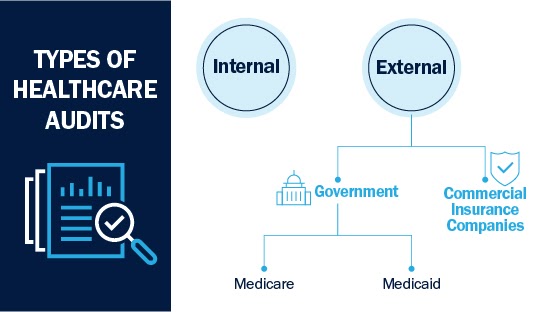
Managing the Different Types of Healthcare Audits:
In the healthcare space, audits often play a crucial role in measuring compliance and patient satisfaction. However, audits also put a hospital or health system at risk by increasing exposure to financial losses. The first step to mastering audits is understanding that there are several types, each of which requires a different response from your team.
What is the purpose of a healthcare audit?
The purpose of an internal healthcare audit is to develop and follow an official process to assess, analyze and improve patient care and internal processes. The purpose of an external audit is usually to ensure all parties were paid fairly and accurately in the insurance claims process.
What are the different types of healthcare audits?
There are two main types of healthcare audits that providers face: internal and external. External audits can be broken down further into government and commercial insurance audits. From there, government audits can be broken down even further into Medicare, or Recovery Audits and Medicaid audits.
Audit Response teams that understand the ins and outs of each type of audit are better prepared and positioned to decrease financial exposure by efficiently managing the audit response and appeals process.
Internal auditing in healthcare
The first major type of healthcare audit is an internal audit which takes place entirely inside the hospital facility. Hospitals can commission an internal examination of its finances for several reasons, usually to identify potential audit exposure and to proactively address issues that may result in an audit down the road.
The process usually starts by selecting several subsets of claims inside the organization to see if they are at risk of being audited from a compliance standpoint. For example, a hospital may be concerned paperwork is not being coded correctly. If this is the case, auditors in or outside of the organization may pull a group of codes and analyze from for accuracy. Hospitals can also audit their preauthorization forms and cases. Is staff making sure the correct preauthorization is used for specific types of care?
If several errors are found, the hospital knows it must put together a team to organize and check codes on internal paperwork. It may be tedious, but putting in the work in advance prevents the negative consequences that can occur if an external party decides to audit that hospital’s coding.
Not all internal audits need to be finance-related either. Hospitals can audit standards of care to ensure they fall in line with what has been established by official boards. Any process or element of the organization can be audited to search for means of improvement.
External auditing in healthcare
An external healthcare audit is an examination of a hospital’s finances or processes conducted at the will of an outside party. This outside party is usually either the government or a commercial insurance company looking to ensure correct payments were provided to the hospital for past cases.
• Government healthcare audits
The government provides reimbursement for healthcare services on both a state and federal level following both state and federal guidelines, depending on the type of assistance. There are two main types of government healthcare audits.
The government provides reimbursement for healthcare services on both a state and federal level following both state and federal guidelines, depending on the type of assistance. There are two main types of government healthcare audits.
Medicare
The first type of government healthcare audit is evaluating Medicare claims and reimbursement. Medicare is one of the biggest hospital payors, making up around 40% of the payor mix. Medicare audits are usually conducted by federal government employees or third-party recovery audit contractors.
Medicaid
The second type of government healthcare audit is focussed on Medicaid. Medicaid audits are more often conducted by contractors, but can be done by state government employees. Whoever conducts the audit must have acute knowledge of the state’s laws as Medicaid laws vary from state to state.
Oftentimes contractors will be specialized to audit within a specific state. They can also specialize in auditing a specialized medical subject matter, looking only at cases within that subject matter.
Medicaid audit activity varies depending on several factors. Sometimes the state’s Medicaid office doesn’t employ audit contractors for a period of time, meaning the hospitals within that state experience a short break in Medicaid audits. But trust us – that break doesn’t last forever!
• Commercial insurance healthcare audits
While the government may ebb and flow its audit activity, commercial insurance companies are a different story. Companies, especially larger ones like United Healthcare, Etna, Blue Cross Blue Shield, etc., can and will audit.
When a hospital establishes its contract with the insurance company in addition to negotiating the reimbursement rates it will also establish parameters around what can be audited and how the hospital can respond to that audit. Insurance companies will then audit certain groups of claims based upon these parameters.
Insurance company audits also differ from government audits in that government audits are based upon laws and regulations, where as reimbursement contracts can be negotiated between the hospital and insurance providers.

Healthcare audits vs. claims denials
In the world of audits, the hospital has already been reimbursed and auditors are searching for misaligned reimbursements indicating overpayment or underpayment of claims. But denials are a different ballgame. Audits and denials are related, but the concepts have several key differences.
First, while audits look at groups of cases, denials are on a claim-by-claim basis, not a group. Second, audits take place after the hospital has already been reimbursed. Denials mean the insurance company never paid in the first place and the hospital never saw the revenue. A denial can also be generally defined as the audit result while the audit is the initial examination.
While denials do not come into play with internal audits, they exist across the entire external side of healthcare audits. Insurance companies review and deny claims for several reasons. When a denial occurs, the hospital must go through the denial appeal process to receive reimbursement.
How do hospitals handle healthcare audits?
Traditionally, audits and denials are often complex, involving stacks of meticulously gathered paperwork painstakingly submitted to an outside agency. It’s a balance of keeping up with deadlines while ensuring accuracy in file submission.
Because of the complexities, it’s understandable that teams tasked with handling audit response are focused mainly on handling short-term responsibilities. This gets the job done, but at the cost of overlooking the ideal long term goal: better, more efficient management of audits and denials. Providers should focus on creating a large-scale system dedicated to improved audit and denials management. All teams should work on the same system and be trained in best practices for faster workflows and low rate of error.
The best healthcare audit tools
Oftentimes the best solution for this problem is software-based, providing configurable tools your team can use to bring all audit response workflows into one database. An ideal software should have the following characteristics:
- Automation: Manual tools are subject to human error and require tedious data entry tasks. An integrated system designed for automation eliminates the need for manual process.
- Standardized workflows: The software should be customizable to your hospital’s technical capability and internal audit and denials process. When it comes to health system audit management, there is no
one-size-fits-all. - Real-time work lists: Team members should know who is assigned to work on which task and when. This information should update in real time so team members can better meet deadlines, understand priorities and remain respectful of others’ workloads.
- Data integrity: One of the main perks of software as a solution to audit management is greater confidence in data provided to outside auditors. Whereas data may need to be triple and even quadruple checked in past processes, a quality software will provide peace of mind that the right numbers are delivered to the right people, saving both time and effort.
Creating a single platform and unified, technology-based response to audit management may be the solution your hospital system has been searching for. No matter which type of healthcare audit your team is up against, you will be better prepared to respond quickly and accurately with the right tools under your belt.
Blueway Tracker is a configurable software bringing a comprehensive audit management and response process under one department and one solution. Schedule your free software demo and an expert software specialist will show how Blueway Tracker can decrease your audit exposure and increase your productivity this year.




